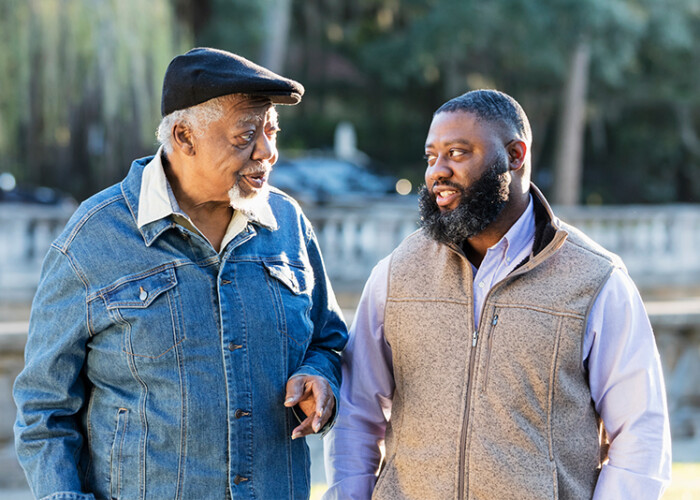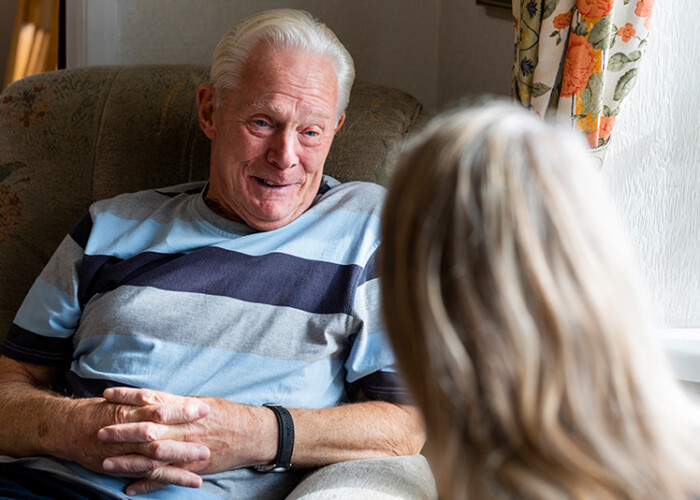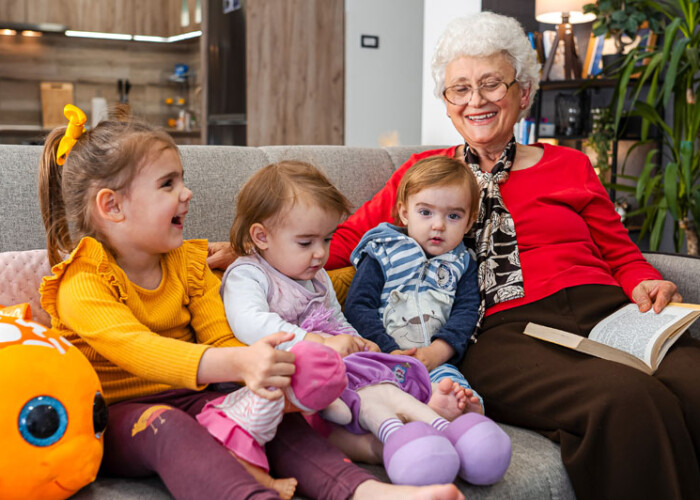Senior Independence
Six Rs to Improve Dementia Care
Use these six essential tips to improve dementia care for someone you love.
Caring for someone with dementia is one of the most meaningful yet challenging roles you can take on. It’s important to remind yourself regularly: You are doing your best. You are making a difference. A little self-affirmation goes a long way, but there’s more to consider when caregiving gets tough. Enter the Six Rs of dementia care—a framework designed to help improve dementia care and better manage the complexities of the disease.
What Are the Six Rs of Dementia Care?
The Six Rs offer a practical, compassionate approach to navigating difficult dementia-related behaviors. By following these steps, you can create a more peaceful, supportive environment:
Reassure
Dementia can make familiar routines and environments suddenly feel intimidating or strange. Loud noises, changes in lighting, unfamiliar visitors, or even … Read More »
How to Be There for a Senior During a Temporary Assisted Living Stay
A temporary assisted living stay can be less overwhelming and more comfortable with these tips.
After a hospitalization or surgical procedure, the doctor may recommend a temporary assisted living stay before the person returns home. This is typically a short-term time of intensive therapy to promote healing and recovery. However, the thought of moving into a nursing home or assisted living facility even for a matter of weeks or months can be extremely difficult to accept.
Parkinson’s Communication Tips to Help You Stay Connected
Try these Parkinson’s communication tips to enhance your ability to connect with someone you love.
Imagine trying to share your thoughts, feelings, or even a simple idea with someone you love, only to feel as though your words are getting lost. Now, consider how isolating it must be if this were an everyday struggle. For someone living with Parkinson’s disease, this is often the reality. Communication becomes increasingly difficult as the disease progresses, creating frustration and emotional strain for both the person with Parkinson’s and their loved ones, making it crucial to know effective Parkinson’s communication tips. It begins with understanding how communication can be affected by the disease.
The Creative Dementia Care Strategy You Need to Try
Improv is one creative dementia care strategy that can be both effective and fun.
Creativity, adaptability, and a healthy dose of lighthearted fun are some of the top ingredients to healthy and effective dementia care. It stands to reason then that a spontaneous activity like improvisation is a great way to connect and engage with someone struggling with cognitive challenges. Not only does it allow you to pivot and embrace unexpected plot twists, but this creative dementia care tactic helps you to learn more about the person in your care.
Is Daily Bathing for Seniors Helpful or Harmful?
Learn the pros and cons of daily bathing for seniors.
Sinking into a warm, soothing, bubble bath at the end of a stressful day, and stepping into a hot, invigorating shower first thing in the morning are daily pleasures for a great many of us. However, it is possible to have too much of a good thing in regards to bathing habits for older adults. You might want to rethink daily bathing for seniors, for a number of reasons:
The Life-Changing Benefits of Purposeful Living for Seniors
Purposeful living for seniors opens new doors to health, happiness, and fulfillment each day.
What exactly is it that gets you out of bed every day? If you’re part of the sandwich generation, providing care for both older and younger loved ones, your list is probably quite extensive! As the nest empties, however, it becomes important to redefine our identity and learn new ways to bring meaning to every day.
How to Overcome Family Denial of Home Care Needs
If you’re encountering family denial of home care needs for an older loved one, these tips will help everyone come to a place of agreement.
When you begin to notice the red flags that care in the home is required for someone you love, it’s very common for that individual to resist the idea. After all, acknowledging the need for assistance is not easy, especially for somebody who prizes their privacy and independence. Yet what do you do when you encounter family denial of home care needs for an older loved one? When you’ve reached an impasse within your family in regards to the need for senior care, there is one potential culprit to consider: denial.
Why Would a Family Member Deny the Need for Care in the Home?
Denial is a coping mechanism employed to protect against … Read More »
The Emotional Journey of End-of-Life Eating Changes
When a loved one is approaching the end of life, every moment becomes even more meaningful, but it can also be a time of great emotional difficulty. One of the changes you may notice is their decreasing interest in food and drink, which can be especially distressing. Watching someone you care about stop eating can leave you feeling worried, helpless, and unsure of how to help. However, understanding why these end-of-life eating changes happen and focusing on providing comfort rather than nourishment can ease this challenging time for both you and the person you love. The goal shifts from ensuring they eat to making sure they are comfortable and at peace.
Why Eating Changes Occur at the End of Life
As a person’s body prepares for the end of life, their need for food and drink diminishes. Metabolism slows, … Read More »
What You Need to Know About End-of-Life Dementia Care
Caring for a loved one as they near the end of life is an incredibly personal journey. When Alzheimer’s disease is part of this experience, the path can become even more intricate. Unlike many other terminal illnesses, dementia progresses in unpredictable ways, requiring us to adjust our approach to end-of-life dementia care.
Identifying End-of-Life Signs in Dementia
In many diseases, the end-of-life stage is marked by noticeable changes in areas such as eating, sleeping, and socializing, often appearing two to four months before death. However, with Alzheimer’s disease, these indicators can emerge much earlier, sometimes even years in advance. These are the key signs to watch for:
Extended Sleep Patterns: Long periods of sleep can occur well before the final stages of life in someone with dementia. While this may be an early sign, it can also continue over a … Read More »
The Importance of a Daily Routine for Someone With Dementia
Have you ever woken up from a dream feeling completely disoriented? The dream seemed so real, and it takes a moment to regain your bearings. For someone with dementia, this disorientation is a part of everyday life. One highly effective way to help is to provide as much stability as possible, and one of the best ways to accomplish this is by sticking to a daily routine for someone with dementia.
How Can a Routine Help Someone With Dementia?
Short-term memory loss makes it challenging for someone with Alzheimer’s to learn and remember new things. A familiar routine helps build self-confidence, reinforce a sense of independence, and reduce anxiety.
To establish the most comfortable routine for a loved one with Alzheimer’s disease, try the following:
Follow their lead. Retain any routines the person already has built: a morning shower before … Read More »
















